| South Slavic languages and dialects |
|---|
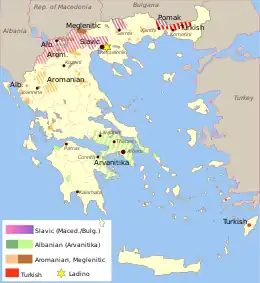
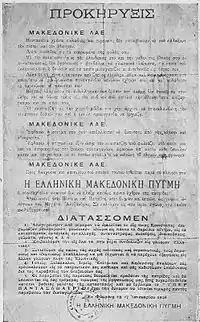
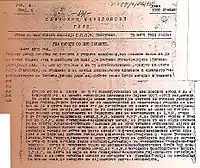
The Slavic dialects of Greece are the Eastern South Slavic dialects of Macedonian and Bulgarian spoken by minority groups in the regions of Macedonia and Thrace in northern Greece. Usually, dialects in Thrace are classified as Bulgarian, while the dialects in Macedonia are classified as Macedonian, with the exception of some eastern dialects which can also be classified as Bulgarian. Before World War II, most linguists[2] considered all of these dialects to be Bulgarian dialects.[3][4][5][6] However, other linguists opposed this view and considered Macedonian dialects as comprising an independent language distinct from both Bulgarian and Serbo-Croatian.[7][8][9][10][11]
Slavic dialects spoken in the region of Greek Macedonia
The continuum of Macedonian and Bulgarian is spoken today in the prefectures of Florina and Pella, and to a lesser extent in Kastoria, Imathia, Kilkis, Thessaloniki, Serres and Drama.[12]
According to Riki van Boeschoten, the Slavic dialects of Greek Macedonia are divided into three main dialects (Eastern, Central and Western), of which the Eastern dialect is used in the areas of Serres and Drama, and is closest to Bulgarian, the Western dialect is used in Florina and Kastoria, and is closest to Macedonian, the Central dialect is used in the area between Edessa and Salonica and is an intermediate between Macedonian and Bulgarian.[13][14] Trudgill classifies certain peripheral dialects in the far east of Greek Macedonia as part of the Bulgarian language area and the rest as Macedonian dialects.[15] Victor Friedman considers those Macedonian dialects, particularly those spoken as west as Kilkis, to be transitional to the neighbouring South Slavic language.[16]
Macedonian dialectologists Božidar Vidoeski and Blaže Koneski consider the eastern Macedonian dialects to be transitional to Bulgarian, including the Maleševo-Pirin dialect.[17][18]
Bulgarian dialectologists claim all dialects and do not recognize the Macedonian. They divide Bulgarian dialects mainly into Eastern and Western by a separating isogloss(dyado, byal/dedo, bel "grandpa, white"(m., sg.)) stretching from Salonica to the meeting point of Iskar and Danube, except for the isolated phenomena of the Korcha dialect as an of Eastern Bulgarian Rup dialects in the western fringes.[19]
The nasal vowels are absent in all Slavic dialects except for the dialects of Macedonian in Greece and the Lechitic dialects (Polabian, Slovincian, Polish and Kashubian).[20] This, along with the preservation of the paroxitonic in the Kostur dialect and Polish, is part of a series of isoglosses shared with the Lechitic dialects, which led to the thesis of a genetic relationship between Proto-Bulgarian and Proto-Macedonian with Proto-Polish and Proto-Kashubian.[21]
The Old Church Slavonic language, the earliest recorded Slavic language, was based on the Salonica dialects.[22] Church Slavonic, long-used as a state language further north in East and West Slavic states and as the only one in Wallachia and Moldavia until the 18th century,[23] influenced other Slavic languages on all levels, including morphonology and vocabulary.[24] 70% of Church Slavonic words are common to all Slavic languages,[25] the influence of Church Slavonic is especially pronounced in Russian, which today consists of mixed native and Church Slavonic vocabulary.
Fringe views
A series of ethnological and pseudo-linguistic works were published by three Greek teachers, notably Boukouvalas and Tsioulkas, whose publications demonstrate common ideological and methodological similarities. They published etymological lists tracing every single Slavic word to Ancient Greek with fictional correlations, and they were ignorant of the dialects and the Slavic languages entirely.[26] Among them, Boukouvalas promoted an enormous influence of the Greek language on a Bulgarian idiom and a discussion about their probable Greek descent.[26] Tsioulkas followed him by publishing a large book, where he "proved" through an "etymological" approach, that these idioms are a pure Ancient Greek dialect.[26] A publication of the third teacher followed, Giorgos Georgiades, who presented the language as a mixture of Greek, Turkish and other loanwords, but was incapable of defining the dialects as either Greek or Slav.[26]
Serbian dialectology does not usually extend the Serbian dialects to Greek Macedonia, but an unconventional classification has been made by Aleksandar Belić, a convinced Serbian nationalist, who regarded the dialects as Serbian.[26] In his classification he distinguished three categories of dialects in Greek Macedonia: a Serbo-Macedonian dialect, a Bulgaro-Macedonian territory where Serbian is spoken and a Non-Slavic territory.
Ban for use, language shift and language death
After the conclusion of the First World War a widespread policy of Hellenisation was implemented in the Greek region of Macedonia.[27][28][29] Personal and topographic names were forcibly changed to their Greek versions.[30] Cyrillic inscriptions across Northern Greece were removed from gravestones and churches.[30][31] Under the regime of Ioannis Metaxas a law was passed banning the Bulgarian language.[32][33] Many people who broke the rule were deported,[34] or arrested, and beaten.[28] During the Cold War cases of discrimination against people who spoke in local dialects had been reported. In 1959 the inhabitants of three villages adopted a 'language oath', renouncing their Slavic dialect on the initiative of local government officials.[35] After the fall of Communism the issue has continued. In 1994 report by the Human Rights Watch, Greece implemented a program, which refuses the teaching of any Slavic language. The Greek state continues to exclude the Slavic speakers of Greek Macedonia from operating TV-, or radio-stations in local Slavic.[36] As result per Christian Voss in the Western and Central areas of Greek Macedonia is visible the typical situation of language shift and decreased proficiency from the Slavic vernacular to Greek as follows: "Households with almost monoglot Slavic-speaking grandparents, bilingual parents, and monoglot Greek-speaking children with a passive knowledge of Slavic." On the other hand, in Eastern Macedonia are a symptoms of full assimilation, which led to a language death.[37]
Slavic dialects spoken in the region of Thrace

Some of the Rup dialects of the Bulgarian language are spoken by the Pomaks in Western Thrace in Greece. These dialects are native also in Bulgaria, and are classified as part of the Smolyan subdialect.[39] Not all Pomaks speak this dialect as their mother language.[40] It is generally qualified by Bulgarian researchers as an "archaic dialect" with some conservative features, which bear witness to an intermediate state of transition from Old Bulgarian/Old Church Slavonic to the modern Bulgarian language.[41]
Attempts of codification
Greek governmental codification
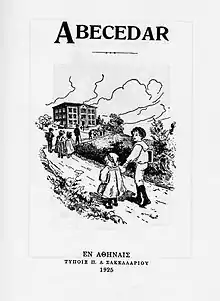
Under the 1920 Treaty of Sèvres, Greece had agreed to open schools for minority-language children. In September 1924 Greece also agreed to a protocol with Bulgaria to place its Slavic-speaking minority under the protection of the League of Nations as Bulgarians. However, the Greek parliament refused to ratify the protocol due to objections from Serbia, and from Greeks who considered the Slavic-speakers to be Slavicized Greeks rather than Slavic people.[42] Vasilis Dendramis, the Greek representative in the League of the Nations, stated that the Macedonian Slav language was neither Bulgarian, nor Serbian, but an independent language. The Greek government went ahead with the publication in May 1925 of the Abecedar, described by contemporary Greek writers as a primer for "the children of Slav speakers in Greece ... printed in the Latin script and compiled in the Macedonian dialect."[43] The book's publication sparked controversy in Greek Macedonia, along with Bulgaria and Serbia. The Bulgarians and Serbs objected to the book being printed in Latin alphabet.[44] In January 1926, the region of Florina saw extensive protests by Greek and pro-Greek Slavic speakers campaigning against the primer's publication, demanding the government change its policies on minority education.[45] As result although some books reached villages in Greek Macedonia, it was never used in their schools.[42]
Greek communists’ codification
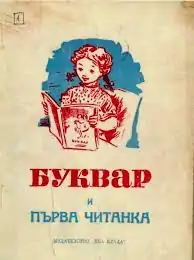
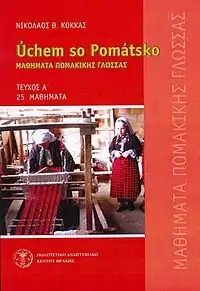
After the Tito–Stalin split in 1948, under the auspices of some Macedonian intellectuals in Bucharest, anti-Yugoslav alphabet, grammar, and primer closer to Bulgarian, purified of the Serbo-Croatian loanwords of the language of Skopje were created.[46][47] The Communist Party of Greece led by Nikos Zahariadis took the side of the Cominform. After the defeat of communists in the Greek Civil War in 1949, a hunt for Titoist spies began in the midst of Greek political immigrants - civil war refugees, living in socialist countries in Eastern Europe (often coming there after a brief stay in the so-called "Tito's traitorous fascist Yugoslavia"). As a result, the Greek communist publisher "Nea Ellada" issued a Macedonian grammar (1952) and developed a different alphabet. Between 1952 and 1956, the Macedonian Department of Nea Hellas published a number of issues in this literary standard, officially called "Macedonian language of the Slavomacedonians from Greek or Aegean Macedonia". This failed attempt of codification included the Ъ, Ь, Ю, Я, Й and was proclaimed as non-serbianised. However it was merely a form of Bulgarian.[48] This codification did not gain widespread acceptance.[49] The Soviet-Yugoslav rapprochement from the mid-1950s probably helped to put this codification to an end.[47] The grammar was prepared by a team headed by Atanas Peykov.[50] Atanas Peikov himself came to Romania from Bulgaria, where till 1951 he had worked at the Informbureau of Hellas Press. Although this "Aegean Macedonian language" legitimized the symbolic importance of the "Macedonian language" and thus facilitated the later spread of the standard Yugoslav Macedonian norm among the Aegean emigrants, it also delayed this process, creating certain reservations towards the Yugoslav Macedonian standard. Greek refugees educated in this norm were nearly unable to adopt the Yugoslav version later.[47]
Communist refugees from Greece in Australia
The Macedonian Greek Civil War Refugees in Australia issued a Makedonska Iskra (Macedonian Spark). It was the first Macedonian newspaper published in Australia, from 1946 to 1957. The Makedonska Iskra was also thrown into confusion by the expulsion of Yugoslavia from the Cominform.[51] The newspaper was printed in the Latin alphabet. Its articles were not in standard Macedonian but in local Slavic dialects of Greece. Some of the Slavic texts were in mixed Bulgaro-Macedonian language or were written in Bulgarian language.[52] A monthly with national distribution, it commenced in Perth and later moved to Melbourne and Sydney.
Pomak language
In Greece, attempts to write the Pomak language in formal publications have been criticized because their script, whether it was in Greek or in Latin. Since the 1990s several publications in Pomak dialect have been issued using either script. Some criticisms to these publications were related to their funding sources. For example, by the cases using the Greek script, two volumes of a textbooks were printed in 2004. Their author was Nikos Kokkas and publisher Pakethra. Its funding was provided by a Greek businessman and directly through his company. The preface of a Pomak primer presents it as one of the "lesser-spoken languages" of Europe.[53] The use of Pomak in writing is very limited. It is even not used in the local Pomak newspaper "Zagalisa", that is published in Greek. Recently, the use of Pomak is preferred in a new local newspaper "Natpresh". Pomak is not being actively promoted by either Pomak communities or by Greek authorities. The result is a strong language shift in Greece towards Turkish.[41]
Features
Comparison of the Slavic dialects of Greece with Standard Macedonian and Bulgarian | |||||||||||||||||||||||||||||||||||||||||||||||||||||||||||||||||||||||||||||
|---|---|---|---|---|---|---|---|---|---|---|---|---|---|---|---|---|---|---|---|---|---|---|---|---|---|---|---|---|---|---|---|---|---|---|---|---|---|---|---|---|---|---|---|---|---|---|---|---|---|---|---|---|---|---|---|---|---|---|---|---|---|---|---|---|---|---|---|---|---|---|---|---|---|---|---|---|---|
|
See also
References
- ↑ See Ethnologue (); Euromosaic, Le (slavo)macédonien / bulgare en Grèce, L'arvanite / albanais en Grèce, Le valaque/aromoune-aroumane en Grèce, and Mercator-Education: European Network for Regional or Minority Languages and Education, The Turkish language in education in Greece. cf. also P. Trudgill, "Greece and European Turkey: From Religious to Linguistic Identity", in S Barbour, C Carmichael (eds.), Language and nationalism in Europe, Oxford University Press 2000.
- ↑ Hupchick, Dennis P. (1995). Conflict and Chaos in Eastern Europe. Palgrave Macmillan. p. 143. ISBN 0312121164.
The obviously plagiarized historical argument of the Macedonian nationalists for a separate Macedonian ethnicity could be supported only by linguistic reality, and that worked against them until the 1940s. Until a modern Macedonian literary language was mandated by the communist-led partisan movement from Macedonia in 1944, most outside observers and linguists agreed with the Bulgarians in considering the vernacular spoken by the Macedonian Slavs as a western dialect of Bulgarian
- ↑ Mladenov, Stefan. Geschichte der bulgarischen Sprache, Berlin, Leipzig, 1929, § 207-209.
- ↑ Mazon, Andre. Contes Slaves de la Macédoine Sud-Occidentale: Etude linguistique; textes et traduction; Notes de Folklore, Paris 1923, p. 4.
- ↑ Селищев, Афанасий. Избранные труды, Москва 1968, с. 580-582.
- ↑ Die Slaven in Griechenland von Max Vasmer. Verlag der Akademie der Wissenschaften, Berlin 1941. Kap. VI: Allgemeines und sprachliche Stellung der Slaven Griechenlands, p.324.
- ↑ Antoine Meillet (French, linguist, 1928): Their dialects, differing among themselves, are not truly Serbian nor truly Bulgarian, especially if one is thinking of written Bulgarian, which is based on dialects quite far removed from the Macedonian dialects. In reality these dialects do not properly belong to either the one or the other of the two groups under dispute.
1. Todor Dimitrovski, Blaže Koneski, Trajko Stamatoski. About the Macedonian language; "Krste Misirkov" Institute of the Macedonian Language, 1978; p.31.
2. Kulturen Život. Macedonian Review, Volume 10; Kulturen Zhivot., 1980; p.105 - ↑ Vaillant, André (1938), "Le Problème du slave macédonien, Bulletin de la Société linguistique, 39, 2(# 116): 194–210, cited in Fishman, J. A. (ed) (1993), The Earliest Stage of Language Planning, New York, p. 164.
- ↑ Małecki, M. (1938), Z zagadnień dialektologii macedońskiej, Rocznik slawistyczny, 14: 119–144, cited in Fishman, J. A. (ed) (1993), The Earliest Stage of Language Planning, New York, p. 164.
- ↑ "Несмотря на значительное диаметральное разнообразие, македонские говоры представляют собою единство и заметно отличаются от народных говоров Фракии, Родоп, Мизии и Балкан" [Despite their considerable diametrical diversity, Macedonian dialects represent a [linguistic] whole and differ markedly from the folk dialects of Thrace, the Rhodopes, Moesia and the Balkans]. Berstein, S. (1938), Great Soviet Encyclopedia, no. 36, p. 743, cited in Bernstein (1944), Несколько замечаний о македонском литературном языке [Some remarks on the Macedonian literary language].
- ↑ Alexis Heraclides, The Macedonian Question and the Macedonians: A History, Taylor & Francis, 2021, ISBN 9780429266362, pp. 152–153.
- ↑ "The European Union and Lesser-Used Languages". European Parliament. 2002: 77.
Macedonian and Bulgarian are the two standard languages of the eastern group of south Slavonic languages. In Greek Macedonia several dialectal varieties, very close to both standard Macedonian and Bulgarian, are spoken ... The two words (Macedonian and Bulgarian) are used here primarily because they are the names the speakers use to refer to the way they speak. In fact, many speak of 'our language' (nasi) or 'the local language' (ta dopia): the use of actual names is a politically charged national issue ... Yet (Slavo)Macedonian/ Bulgarian is still spoken by considerable numbers in Greek Macedonia, all along its northern borders, specially in the Prefectures of Florina, Pella, and to a lesser extent in Kastoria, Kilkis, Imathia, Thessalonika, Serres and Drama.
{{cite journal}}: Cite journal requires|journal=(help) - ↑ Boeschoten, Riki van (1993): Minority Languages in Northern Greece. Study Visit to Florina, Aridea, (Report to the European Commission, Brussels) "The Western dialect is used in Florina and Kastoria and is closest to the language used north of the border, the Eastern dialect is used in the areas of Serres and Drama and is closest to Bulgarian, the Central dialect is used in the area between Edessa and Salonica and forms an intermediate dialect"
- ↑ Ioannidou, Alexandra (1999). Questions on the Slavic Dialects of Greek Macedonia. Athens: Peterlang. pp. 59, 63. ISBN 9783631350652.
In September 1993 ... the European Commission financed and published an interesting report by Riki van Boeschoten on the "Minority Languages in Northern Greece", in which the existence of a "Macedonian language" in Greece is mentioned. The description of this language is simplistic and by no means reflective of any kind of linguistic reality; instead it reflects the wish to divide up the dialects comprehensibly into geographical (i.e. political) areas. According to this report, Greek Slavophones speak the "Macedonian" language, which belongs to the "Bulgaro-Macedonian" group and is divided into three main dialects (Western, Central and Eastern) - a theory which lacks a factual basis.
{{cite book}}:|journal=ignored (help) - ↑ Trudgill P., 2000, "Greece and European Turkey: From Religious to Linguistic Identity". In: Stephen Barbour and Cathie Carmichael (eds.), Language and Nationalism in Europe, Oxford : Oxford University Press, p.259.
- ↑ Heine, Bernd; Kuteva, Tania (2005). Language Contact and Grammatical Change. Cambridge University Press. p. 118. ISBN 9780521608282.
in the modern northern and eastern Macedonian dialects that are transitional to Serbo-Croatian and Bulgarian, e.g. in Kumanovo and Kukus/Kilkis, object reduplication occurs with less consistency than in the west-central dialects
- ↑ Fodor, István; Hagège, Claude (309). Language reform : history and future. Buske. ISBN 9783871189142.
The northern dialects are transitional to Serbo-Croatian, whereas the eastern (especially Malesevo) are transitional to Bulgarian. (For further details see Vidoeski 1960-1961, 1962-1963, and Koneski 1983).
- ↑ Vidoeski, Božo (2005). Dialects of Macedonian. Slavica. p. 33. ISBN 9780893573157.
the northern border zone and the extreme southeast towards Bulgarian linguistic territory. It was here that the formation of transitional dialect belts between Macedonian and Bulgarian in the east, and Macedonian and Serbian in the north began.
- ↑ "Карта на диалектната делитба на българския език". Bulgarian Academy of Sciences.
- ↑ Bethin, Christina Y.; Bethin, Christina y (1998). Slavic Prosody: Language Change and Phonological Theory. Cambridge University Press. pp. 84-87. ISBN 9780521591485.
- ↑ Popowska-Taborska, Hanna (2014). "Wczesne dzieje Słowian w świetle ich języka" (PDF). Instytut Slawistyki Polskiej Akademii Nauk. pp. 99–100. ISBN 978-83-64031-10-6. Archived from the original (PDF) on Nov 23, 2018.
Chodzi o wnioskowanie na podstawie różnego rodzaju zbieżności językowych o domniemanym usytuowaniu przodków współczesnych reprezentantów języków słowiańskich w ich słowiańskiej praojczyźnie. Trzy najbardziej popularne w tym względzie koncepcje dotyczą: 1. domniemanych związków genetycznych Słowian północnych (nadbałtyckich) z północnym krańcem Słowiańszczyzny wschodniej, 2. domniemanych związków genetycznych Protopolaków (Protokaszubów) z Protobułgarami i Protomacedończykami oraz … Również żywa jest po dzień dzisiejszy wysunięta w 1940 r. przez Conewa [Conev 1940] teza o domniemanych genetycznych związkach polsko-bułgarskich, za którymi świadczyć mają charakteryzująca oba języki szeroka wymowa kontynuantów ě, nagłosowe o- poprzedzone protezą, zachowanie samogłosek nosowych w języku polskim i ślady tych samogłosek w języku bułgarskim, akcent paroksytoniczny cechujący język polski i dialekty kosturskie. Za dawnymi związkami lechicko-bułgarsko-macedońskimi opowiada się też Bernsztejn [Bernštejn 1961, 1965], który formułuje tezę, że przodkowie Bułgarów i Macedończyków żyli w przeszłości na północnym obszarze prasłowiańskim w bliskich związkach z przodkami Pomorzan i Polaków. Do wymienionych wyżej zbieżności fonetycznych dołącza Bernsztejn zbieżności leksykalne bułgarsko-kaszubskie; podobnie czynią Kurkina [Kurkina 1979] oraz Schuster-Šewc [Schuster-Šewc 1988], którzy– opowiadając się za tezą Conewa i Bernsztejna – powołują się na mój artykuł o leksykalnych nawiązaniach kaszubsko-południowosłowiańskich [Popowska-Taborska 1975a
- ↑ Concise Encyclopedia of Languages of the World. Elsevier. 2010. p. 663. ISBN 9780080877754.
- ↑ Crișan, Marius-Mircea (2017). Dracula: An International Perspective. Springer. p. 114. ISBN 9783319633664.
- ↑ Die slavischen Sprachen / The Slavic Languages. Halbband 2. Walter de Gruyter GmbH & Co KG. 2014. ISBN 9783110215472.
- ↑ Bennett, Brian P. (2011). Religion and Language in Post-Soviet Russia. Routledge. ISBN 9781136736131.
- 1 2 3 4 5 Ioannidou, Alexandra (1999). Questions on the Slavic Dialects of Greek Macedonia. Athens: Peterlang. pp. 56–58. ISBN 9783631350652.
(A) series of etymological and pseudo-linguistic publications ... appeared in Greece ... by "specialists", such as the teachers Giorgos Boukouvalas and Konstantinos Tsioulkas. Boukouvalas published in 1905 in Cairo a brief brochure under the title "The language of the Bulgarophones in Macedonia" (1905). This essay, which assumed the Slav character of the foreign-language idioms of Greek Macedonia by naming them "Bulgarian", included a long list of Slavic words with Greek roots which are used in the dialects. ... Konstantinos Tsioulkas published in 1907 in Athens a book over 350 pages in length to prove the ancient Greek character of the idioms in Greek Macecionia!... : "Contributions to the bilinguism of the Macedonians by comparison of the Slav'-like Macedonian language to Greek" ... Tsioulkas "proved" through a series of "etymological" lists that the inhabitants of Greece's Macedonia spoke a pure Ancient-Greek dialect. ... In 1948 by a third teacher, Giorgos Georgiades, (wrote) under the promising title "The mixed idiom in Macedonia and the ethnological situation of the Macedonians who speak it". Here it is stated that many words from the dialects maintain their "Ancient Greek character". Still, the language itself was presented as a mixture of Greek, Turkish and words borrowed from other languages. As a result, the author found himself incapable of defining it as either Greek or Slav. In examining such publications, one will easily recognise ideological and methodological similarities. One common factor for all the authors is that they ignored not only the dialects they wrote about, but also the Slavic languages entirely. This fact did not hinder them in creating or republishing etymological lists tracing every Slavic word back to Ancient Greek with fictional correlations.
{{cite book}}:|journal=ignored (help) - ↑ HRW 1994, p. ?.
- 1 2 Nettle, Daniel; Suzanne Romaine (2000). Vanishing Voices: The Extinction of the World's Languages. Oxford University Press US. p. 175. ISBN 0-19-513624-1.
- ↑ Pentzopoulos, Dimitri (2002). The Balkan exchange of minorities and its impact on Greece. C. Hurst & Co. Publishers. p. 132. ISBN 1-85065-674-6.
- 1 2 Forward, Jean S. (2001). Endangered peoples of Europe: struggles to survive and thrive. Greenwood Publishing Group. p. 89. ISBN 0-313-31006-8.
- ↑ Simpson, Neil (1994). Macedonia Its Disputed History. Aristoc Press. p. 64. ISBN 0-646-20462-9.
- ↑ Mackridge, Peter; Eleni Yannakakis (1997). Ourselves and Others: The Development of a Greek Macedonian Cultural Identity Since 1912. Berg Publishers. p. 66. ISBN 0-646-20927-2.
- ↑ Simpson, Neil (1994). Macedonia Its Disputed History. Aristoc Press. p. 65. ISBN 0-646-20462-9.
- ↑ The Rising Sun In the Balkans: The Republic of Macedonia, International Affairs Agency, Sydney, Pollitecon Publications, 1995; p.33
- ↑ Van Boeschoten, Riki (2006). "Code-switching, Linguistic Jokes and Ethnic Identity,Reading Hidden Transcripts in a Cross-Cultural Context". Journal of Modern Greek Studies. 25 (2): 347–377. doi:10.1353/mgs.2006.0018. S2CID 145446614.
- ↑ TJ-Hosting (27 January 2008). "MHRMI - Macedonian Human Rights Movement International". Mhrmi.org. Retrieved 5 April 2020.
- ↑ Christian Voss, Language use and language attitudes of a phantom minority. Bilingual Northern Greece and the concept of "hidden minorities".
- ↑ Tomasz Kamusella, Motoki Nomachi, Catherine Gibson as ed., The Palgrave Handbook of Slavic Languages, Identities and Borders, Springer, 2016; ISBN 1137348399, p. 436.
- ↑ Bulgarian dialectology; Stoyan Stoykov; 4th edition, 2002; pp.128-143
- ↑ Иванов, Й. Българска диалектология. Пловдивско Университетско Издателство "П. Хилендарски". Пловдив, 1994 г., с. 80 (Ivanov, J. Bulgarian Dialectology. Plovdiv University Press "P. Hilendarski". Plovdiv, 1994, p. 80)
- 1 2 Evangelia Adamou, Davide Fanciullo. Why Pomak will not be the next Slavic literary language. D. Stern; M. Nomachi; B. Belić. Linguistic regionalism in Eastern Europe and beyond: minority, regional and literary microlanguages, Peter Lang, pp.40-65, 2018.
- 1 2 Danforth, Loring M. The Macedonian Conflict: Ethnic Nationalism in a Transnational World, p. 70. Princeton University Press, 1995. ISBN 0-691-04356-6
- ↑ Andonovski, Hristo. "The First Macedonian Primer between the Two World Wars - The Abecedar". Macedonian Review. 6:64-69.
- ↑ Poulton, Hugh. Who are the Macedonians?, pp. 88-89. C. Hurst & Co, 2000. ISBN 1-85065-534-0
- ↑ Roudometof, Victor. Collective Memory, National Identity, and Ethnic Conflict: Greece, Bulgaria, and the Macedonian Question, p. 102. Greenwood Publishing Group, 2002. ISBN 0-275-97648-3
- ↑ Keith Brown, Macedonia's Child-grandfathers: The Transnational Politics of Memory, Exile, and Return, 1948-1998; Henry M. Jackson School of International Studies, University of Washington, 2003, p. 32.
- 1 2 3 Roumen Daskalov, Tchavdar Marinov, Entangled Histories of the Balkans - Volume One: National Ideologies and Language Policies; BRILL, 2013; ISBN 900425076X, p. 480.
- ↑ Euangelos Kōphos, Speros Basil Vryonis, Nationalism and communism in Macedonia: civil conflict, politics of mutation, national identity; Center for the Study of Hellenism, A. D. Caratzas, 1993, ISBN 0892415401, p. 203.
- ↑ Sebastian Kempgen, Peter Kosta, Tilman Berger, Karl Gutschmidt as ed., The Slavic Languages. Volume 32 of Handbooks of Linguistics and Communication Science (HSK) Walter de Gruyter, 2014; ISBN 3110215470, p. 1476.
- ↑ The Macedonian Times, issues 51–62; MI-AN, 1999, p. 141.
- ↑ Miriam Gilson, Jerzy Zubrzycki, The Foreign-language Press in Australia, 1848-1964, Australian National University, 1967, p. 149.
- ↑ Voenno-istoricheski sbornik, Volume 64, Issues 1-2, Institut za voenna istoria, Ministerstvo na otbranata, Sofia, 1995, str. 49.
- ↑ Vemund Aarbakke, "Pomak Language Usage and the Spell of Nationalism—The Case of the Pomaks in Greece," Slavia Islamica: language, religion and identity, edited by Robert D. Greenberg, Motoki Nomachi, Slavic Eurasian studies; no. 25, Slavic Research Center, Hokkaido University, pp. 149-177.
Bibliography
- Trudgill P. (2000) "Greece and European Turkey: From Religious to Linguistic Identity" in Language and Nationalism in Europe (Oxford: Oxford University Press)
- Iakovos D. Michailidis (1996) "Minority Rights and Educational Problems in Greek Interwar Macedonia: The Case of the Primer 'Abecedar'". Journal of Modern Greek Studies 14.2 329–343